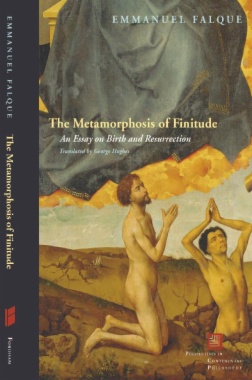This book starts off from a philosophical premise: nobody can be in the world unless they are born into the world. It examines this premise in the light of the theological belief that birth serves, or ought to serve, as a model for understanding what resurrection could signify for us today. After all, the modern Christian needs to find some way of understanding resurrection, and the dogma of the resurrection of the body is vacuous unless we can relate it philosophically to our own world of experience.
Nicodemus first posed the question "How can anyone be born after having grown old?
Can one enter a second time into the mother's womb and be born?" This book reads that problem in the context of contemporary philosophy (particularly the thought of Husserl, Heidegger, Sartre, Merleau-Ponty, and Deleuze). A phenomenology of the body born "from below" is seen as a paradigm for a theology of spiritual rebirth,
and for rebirth of the body from "on high."
The Resurrection changes everything in Christianity—but it is also our own bodies that must be transformed in resurrection, as Christ is transfigured. And the way in which I hope to be resurrected bodily in God, in the future, depends upon the way in which I live bodily today.
- Cover
- The Metamorphosis of Finitude
- Title
- Copyright
- Contents
- Preface to the English Edition
- Preface: The Beaune Altarpiece, or “The Germination of the Resurrected”
- Introduction: To Be Transformed
- §1. From Death to Birth
- §2. The Dialogue with Nicodemus
- §3. The Heuristic Approach and Didactic Exposition
- PART I: PRÉCIS OF FINITUDE
- 1 Impassable Immanence
- §4. The Immanence in Question
- §5. The Preemption of the Infinite
- §6. Christian Specificity and the Ordinariness of the Flesh
- 2 From Time to Time
- §7. The Drift of Time
- §8. The Passage of Time
- §9. The Burden of Time
- 3 Is There a Drama of Atheist Humanism?
- §10. The Death of God, or the Death of Christianity?
- §11. Atheism from the Theologian’s Viewpoint
- §12. The Forbidden “Why?”
- PART II: TOWARD A METAMORPHOSIS
- 4 Resurrection and the Over-resurrection of the Body
- §13. The Debate with Nietzsche
- §14. Corporality in St. Paul
- §15. A Phenomenal Body-to-Body Confrontation
- 5 The Resurrection Changes Everything
- §16. The Ordeal of the Father
- §17. The Apperceptive Transposition of the Son
- §18. The Holy Spirit as the Son Metamorphosed by the Father
- 6 The Incorporation of the Human Being
- §19. The Monadologic Hypothesis
- §20. Incorporation in the Trinity
- §21. He Who Sees and He Who Runs
- PART III: PHENOMENOLOGY OF THE RESURRECTION
- 7 The World Become Other
- §22. The Earth and the Heavens
- §23. Creation and Separation
- §24. Another Way of Living the Same World
- 8 From Time to Eternity
- §25. The Instant of Eternity
- §26. The Joy of Birth
- §27. The Birth and Knowledge of God
- 9 A Flesh for Rebirth
- §28. Birth and Rebirth
- §29. The Fleshly Body and the Body Resurrected
- §30. Withdrawal of the Body and Manifestation of the Flesh
- Conclusion: Waiting for Bodies to Arise
- Notes
- Index

